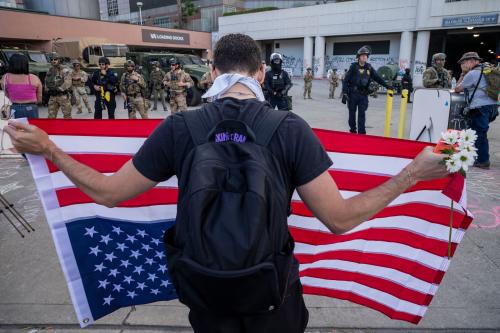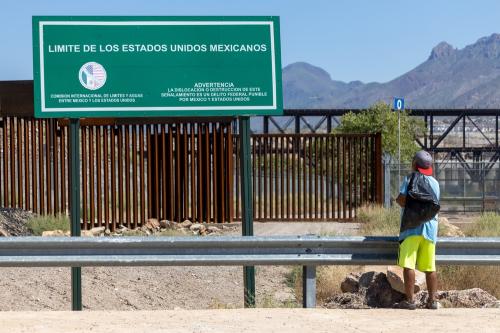The Global Economy and Development program is thrilled to welcome Marcela Escobari back to the Brookings Institution as a senior fellow.
Marcela was previously a senior fellow with Brookings where she launched the Workforce of the Future, an initiative that identifies policies to restore opportunity and enable inclusive growth in U.S. cities and states. She created data tools to help displaced workers find economic mobility and make job transitions.
Marcela’s career has spanned the private sector, government, and academia, with a common thread of producing growth that is inclusive and sustainable. She has been twice confirmed by the U.S. Senate under President Barack Obama and President Joe Biden, and most recently served in the White House National Security Council as special assistant to the president and as U.S. representative for the Los Angeles Declaration on Migration and Protection. She led efforts to promote safe, orderly, and humane migration and advance a collaborative, regional response to the displacement of over 8 million people across Latin America and the Caribbean. This regional response contributed to an over 70% decrease in irregular migration at the U.S. border in 2024, helping stabilize and integrate over 4.5 million migrants and refugees within Latin America.
Marcela is recognized for bringing evidence to policymaking and driving results in multistakeholder initiatives. Previously she was executive director of Harvard University’s Center for International Development and led the Bureau for Latin America and the Caribbean at the U.S. Agency for International Development (USAID).
Marcela brings a rare mix of analytical rigor and practical policymaking experience that epitomizes the impact Brookings seeks to have in the world. Her previous work on economic mobility and strengthening the middle class remains all too relevant. Her current focus on newcomers, particularly as displacement continues to grow around the globe, will help us find innovative ways to manage migration in sustainable and humane ways. We are excited to welcome Marcela back to the Global program at Brookings as she carries on this important work.
Brahima S. Coulibaly, Vice President, Global Economy and Development, Brookings
Brookings is excited to welcome Marcela back to our ranks. We sat down with her to discuss her research agenda and perspectives from her time in government working on one of the most contentious issues in American politics.
Esther Lee Rosen (ELR): As head of USAID for Latin America and the Caribbean for the Biden administration you had to focus on a myriad of urgent topics: economic recovery after the pandemic, democratic backsliding across the hemisphere from El Salvador to Guatemala, climate resiliency, and more. Where did migration rank in your list of priorities?
Marcela Escobari (ME): With the reach and resources of the U.S. government and different tools in our arsenal from diplomacy to foreign aid, we made progress on many fronts. Just to give some examples: We helped deliver 70 million vaccines to slow the spread of COVID-19 in 29 countries, stopped famine and the spread of cholera in conflict-ridden Haiti, and helped democratic forces succeed in Guatemala.
But migration was front and center throughout my tenure. Migration disruptions have been growing and are not going to disappear with an executive order. When I left the Obama administration, we were confronting what we felt was an acute emergency in Venezuela with 300,000 people having fled the country due to the repression and disastrous economic mismanagement under the Maduro regime. When I came back during the Biden administration, that number had ballooned to 7 million people.
Migration presents a unique challenge. It is an issue where evidence and politics are often the furthest apart because the topic is so easy to weaponize. But with the right policies, migration can be a force for good—a catalyst for economic growth and a source of creativity and innovation. There is a lot at stake in getting the issue of migration right.
ELR: In managing this complex topic, both at USAID and later the White House, what were some of the lessons you learned?
ME: There were many. But let me share some salient ones.
Enforcement measures—imposing consequences for migrants who enter the U.S. irregularly—need to be paired with lawful pathway options. One without the other makes migration management unsustainable. Lawful pathways can be narrow, but they offer a legal and safe alternative for those that would otherwise put their fates in the hands of criminal networks to flee their current situation.
Also, U.S. policy matters, but it is one part of a larger equation. The migration debate in the U.S. often focuses solely on our southwest border, but we need to look further south for solutions and partners. It is a regional challenge that cannot be managed unilaterally.
As just one example, countries across the hemisphere have implemented policies to provide legal status and integrate migrants. These policies are not only good for migrants but good for the United States, as they give migrants reasons to remain in the region and not continue moving north. And they pay off for host communities too in the form of increased economic activity, a larger tax base, and filling job gaps in countries like Colombia and Peru.
ELR: What do you hope to focus on as you get started at Brookings?
ME: There is a lot that we learned from managing the largest displacement of people in the Western Hemisphere’s history. These lessons will be helpful not only as we seek to drive an effective and sustainable migration policy in the U.S., but our experience can also inform other countries’ policies as displacement will continue to be part of our reality.
There were some policies that worked better than others—but the record flows of people coming to our border and our limited tools due to congressional inaction meant there was tremendous innovation and rapid iteration. Many of those innovations were successful. The CBP One app, which was expanded to help migrants schedule asylum processing for instance, gave us greater control over the number of individuals arriving at the border each day. The CHNV Parole Program reduced encounters from Cuba, Haiti, Nicaragua, and Venezuela while creating a legal option for some individuals from these countries to apply to come to the United States. By January 2025, the number of border encounters had decreased by over 75% from the high point in December 2023. Most importantly, for the first time in history, more of the flows came from legal channels than via irregular entries, which meant that we could vet people, help lawful migrants integrate, and control the levels of migration coming to our border.
At Brookings, I hope to dive deeper into those lessons and bring data, evidence, and expertise to help us think about what pragmatic migration policy in the national interest can look like in times of migratory pressures. I also hope we can continue to partner with countries across the hemisphere and beyond to sustainably manage migration in safe, orderly, and humane ways.
ELR: Will your research look at policies in other countries?
ME: One of the less-known facts of the recent migration crisis is how the Western Hemisphere has come together with bold policies to face the massive displacement. More than 85% of the 10 million displaced people in Latin America went to four countries: Colombia, Brazil, Ecuador, and Peru. There is an extraordinary experiment going on in South America with countries implementing bold legalization and integration policies for this new wave of migrants. It is already paying off—the International Monetary Fund predicts Colombia and Ecuador will see a 4.5% increase in GDP from these integration efforts. In Bogota alone, migrants created over 9,000 new businesses in a three-year period. The U.S. worked hand in hand with these partners, supporting the stabilization and integration of migrants throughout the region with foreign aid and the sharing of best practices.
I hope to continue to help countries learn in real time from this experiment and navigate this hot topic with pragmatic solutions that work for migrants and local populations.
There are also important similarities between the migration challenges facing Europe and those facing the Western Hemisphere. When I was at the White House, I engaged quite a bit with European partners to share lessons and insights. I also hope to look more closely at the policies that European countries have adopted and continue that exchange of ideas.
ELR: You started the Workforce of the Future initiative when you were back here, focused on how to address the hollowing out of the American middle class and help low-wage workers achieve economic mobility. Will your new agenda connect with that work?
ME: Absolutely. It is two sides of the same coin. Managing migration flows in the national interest can have profound implications for domestic growth and economic mobility for the local workforce. Migrant labor can complement local labor, help locals (particularly minorities) achieve economic mobility, and create jobs through new entrepreneurial activity. But it does not happen automatically. We need targeted policies that help new and native workers adapt to industrial change, we need communities that have the capability to integrate migrants effectively, and we need lawful pathways to allow us to control flows that match our national interests and communities’ appetite for growth.
ELR: Do you think that there is room for a rethink on migration policy—more so given the current politicization and polarization in general, and on this topic in particular?
ME: Yes, I do. The ideological extremes that often dominate the migration debate do not serve U.S. national interests and that will become more and more evident. Mass deportations and an enforcement-only approach is unsustainable, and it is contrary to our values as a nation of immigrants and to our economic interests. I think there will be a growing political center on this issue as conservatives and liberals come to an understanding that we need better tools and policies to manage migration. Our interests are not one-dimensional. We need a migration policy that secures the border while also being able to adapt to our labor needs, support our humanitarian response to crises across the globe, and fulfill our historic role as a land of opportunity to those fleeing persecution.
The Brookings Institution is committed to quality, independence, and impact.
We are supported by a diverse array of funders. In line with our values and policies, each Brookings publication represents the sole views of its author(s).







Commentary
A migration policy in the national interest: Welcoming Marcela Escobari back to Brookings
March 18, 2025